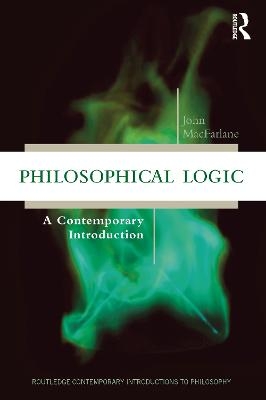
Philosophical Logic
A Contemporary Introduction
Seiten
2020
Routledge (Verlag)
978-1-138-73765-5 (ISBN)
Routledge (Verlag)
978-1-138-73765-5 (ISBN)
Treats philosophical logic in an integrated way, showing how philosophical considerations motivate the technical projects, and how the constraints revealed by the technical projects illuminate the philosophical issues. Coverage include quantifiers, modal logic, indicative conditionals, intuitionistic logic, and much more.
Introductory logic is generally taught as a straightforward technical discipline. In this book, John MacFarlane helps the reader think about the limitations of, presuppositions of, and alternatives to classical first-order predicate logic, making this an ideal introduction to philosophical logic for any student who already has completed an introductory logic course.
The book explores the following questions. Are there quantificational idioms that cannot be expressed with the familiar universal and existential quantifiers? How can logic be extended to capture modal notions like necessity and obligation? Does the material conditional adequately capture the meaning of 'if'—and if not, what are the alternatives? Should logical consequence be understood in terms of models or in terms of proofs? Can one intelligibly question the validity of basic logical principles like Modus Ponens or Double Negation Elimination? Is the fact that classical logic validates the inference from a contradiction to anything a flaw, and if so, how can logic be modified to repair it? How, exactly, is logic related to reasoning? Must classical logic be revised in order to be applied to vague language, and if so how? Each chapter is organized around suggested readings and includes exercises designed to deepen the reader's understanding.
Key Features:
An integrated treatment of the technical and philosophical issues comprising philosophical logic
Designed to serve students taking only one course in logic beyond the introductory level
Provides tools and concepts necessary to understand work in many areas of analytic philosophy
Includes exercises, suggested readings, and suggestions for further exploration in each chapter
Introductory logic is generally taught as a straightforward technical discipline. In this book, John MacFarlane helps the reader think about the limitations of, presuppositions of, and alternatives to classical first-order predicate logic, making this an ideal introduction to philosophical logic for any student who already has completed an introductory logic course.
The book explores the following questions. Are there quantificational idioms that cannot be expressed with the familiar universal and existential quantifiers? How can logic be extended to capture modal notions like necessity and obligation? Does the material conditional adequately capture the meaning of 'if'—and if not, what are the alternatives? Should logical consequence be understood in terms of models or in terms of proofs? Can one intelligibly question the validity of basic logical principles like Modus Ponens or Double Negation Elimination? Is the fact that classical logic validates the inference from a contradiction to anything a flaw, and if so, how can logic be modified to repair it? How, exactly, is logic related to reasoning? Must classical logic be revised in order to be applied to vague language, and if so how? Each chapter is organized around suggested readings and includes exercises designed to deepen the reader's understanding.
Key Features:
An integrated treatment of the technical and philosophical issues comprising philosophical logic
Designed to serve students taking only one course in logic beyond the introductory level
Provides tools and concepts necessary to understand work in many areas of analytic philosophy
Includes exercises, suggested readings, and suggestions for further exploration in each chapter
John MacFarlane is Professor of Philosophy and a member of the Group in Logic and the Methodology of Science at the University of California, Berkeley. He is the author of Assessment Sensitivity: Relative Truth and Its Applications (2014).
1. Fundamentals 2. Quantifiers 3. Modal Logic 4. Conditionals 5. Logical Consequence via Models 6. Logical Consequence via Proofs 7. Relevance, Logic, and Reasoning 8. Vagueness and the Sorites Paradox
| Erscheinungsdatum | 17.12.2019 |
|---|---|
| Reihe/Serie | Routledge Contemporary Introductions to Philosophy |
| Zusatzinfo | 4 Tables, black and white; 8 Line drawings, black and white; 8 Illustrations, black and white |
| Verlagsort | London |
| Sprache | englisch |
| Maße | 152 x 229 mm |
| Gewicht | 344 g |
| Themenwelt | Geisteswissenschaften ► Philosophie ► Logik |
| Geisteswissenschaften ► Philosophie ► Metaphysik / Ontologie | |
| ISBN-10 | 1-138-73765-8 / 1138737658 |
| ISBN-13 | 978-1-138-73765-5 / 9781138737655 |
| Zustand | Neuware |
| Informationen gemäß Produktsicherheitsverordnung (GPSR) | |
| Haben Sie eine Frage zum Produkt? |
Mehr entdecken
aus dem Bereich
aus dem Bereich
ein Gegenentwurf zum kurzfristigen Denken : so werden wir zu den …
Buch | Hardcover (2023)
REDLINE (Verlag)
CHF 27,90
Buch | Softcover (2023)
De Gruyter (Verlag)
CHF 34,90


